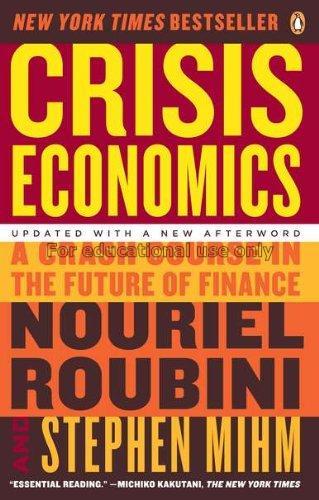Crisis economics : a crash course in the future of finance / Nouriel Roubini and Stephen Mihm
Author : Roubini, Nouriel

Roubini (Bailouts or Bail-ins), a professor of economics at NYU, was greeted with skepticism when he warned a 2006 meeting of the IMF that a deep recession was imminent. Along with economics historian Mihm, (A Nation of Counterfeiters) Roubini provides an in-depth analysis of the role of crises in capitalist economies from a historical perspective. With thumbnail sketches of nineteenth and twentieth century economic thought from Smith, Keynes, and others, they provide a context for understanding financial markets and the ways in which bankers and politicians relate to them. The authors also offer a theoretical context for understanding the current economic crisis and for using it as "an object lesson... in how to foresee them, prevent them, weather them, and clean up after them." Dismissing the "quaint beliefs" that markets are "self-regulating," they take issue with the simplistic populist assumption that the present crisis was caused by greed or something "as inconsequential as subprime mortgages." They blame Alan Greenspan's refusal to use the power of the Fed to dampen unbridled speculation, choosing instead to pump "vast quantities of easy money into the economy and keep it there for too long." This will be a useful guide for readers attempting to get a handle on the present crisis
| Barcode | Call No. | Volume | Status | Due Date | Total Queue | |
|---|---|---|---|---|---|---|
| 1010076041 | EC00180 | On Closed Stack | 0 | Please Login |
Related Book